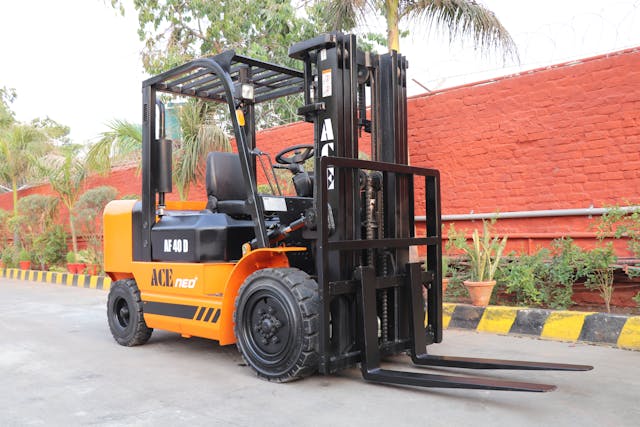Forklifts don’t just break down suddenly. They give you warnings—small, subtle signs that something’s off. And if you know what to watch for, you can catch problems before they turn into expensive repairs or dangerous situations.
Whether you’re operating the forklift yourself or managing a site that relies on them daily, these are the top red flags you shouldn’t ignore.
1. It’s Making Unusual Noises
A forklift isn’t silent, but you’ll get used to the regular hum, engine noise, or whirring. That’s why it’s easy to spot when something sounds different. Strange noises usually don’t mean something small. They’re often early signs of:
- Worn-out brakes
- Transmission trouble
- Loose or damaged parts
- Issues with the mast or chains
If you hear screeching, grinding, clunking, or anything that makes you pause and think, stop using the machine. Continuing to operate it can cause further damage, or worse, lead to an accident. Instead, get in touch with an experienced forklift service and repair company so they can assess the issue. The key thing here is not to wait for the noise to get louder. The first strange sound is already a warning.
2. Fluid’s Leaking (Even a Little Bit)
Leaking fluid is never something to brush off. It doesn’t matter how small the puddle looks, if there’s fluid under or around the forklift, something’s wrong.
Most leaks come from:
- Hydraulic systems
- Brake lines
- Engine components
- Cooling systems
These aren’t optional parts. If your hydraulic fluid is leaking, your lifting function might start failing. Brake fluid? That’s a safety risk. Even water from a cooling system can affect engine temperature and cause overheating if left unchecked.
Keep an eye on the ground where the forklift is usually parked. If you start noticing wet spots, report it before the issue spreads.
3. It Doesn’t Lift Like It Used To
If the forks are jerking, shaking, or hesitating while lifting, that’s not normal wear and tear. That’s a sign of a bigger problem. There could be air in the hydraulics. The fluid might be contaminated. Maybe one of the lift cylinders is on its way out. Whatever the cause, it needs attention.
The problem with unstable lifting isn’t just the risk of damaging stock. It can unbalance the whole machine, especially at height. That puts the load, the operator, and nearby workers at risk. Even a one-second delay when lowering a heavy pallet should raise concern. Smooth, reliable lifting is non-negotiable.
4. Dashboard Warnings Are Flashing
Modern forklifts come with warning lights for a reason. Still, they’re often ignored because everything seems to be running fine.
Don’t do that.
If a light pops up on the dash, whether it’s for brakes, engine temperature, oil pressure, or battery levels, it means the system has already detected a problem. By the time you see a warning, something’s already outside the normal range.
Even if it’s a single light and the forklift “feels okay,” it should be looked at. Sensors don’t trigger randomly. They’re trying to prevent the very damage you’ll deal with if you ignore them.
5. It’s Losing Power or Handling Feels Off
You know how your forklift usually performs. So if something feels off—sluggish acceleration, struggling to carry regular loads, unsteady steering—that’s a red flag.
Power issues can come from all sorts of places:
- A failing engine
- Blocked fuel lines
- Battery degradation
- Transmission wear
Handling problems might mean tyre wear, misaligned components, or steering system faults. Either way, if you notice a drop in performance or control, it’s not just a comfort issue; it’s a safety one. Especially when you’re carrying loads or working in tight spaces.
Why These Signs Matter
Ignoring early warning signs can end in a forklift completely out of service, costing you both time and money. More importantly, it increases the risk of injury. A leaking hydraulic hose or delayed steering can go from annoying to dangerous in seconds.
Catching these signs early means less time off the floor, cheaper repairs, better performance, and safer conditions for everyone. It’s about staying ahead of problems rather than reacting to them.
Make Daily Checks a Habit
You don’t need to be a mechanic. But a simple look, listen, and feel before each shift can help spot trouble early.
Just a few things to notice:
Does it sound normal?
Is anything leaking underneath?
Are the forks lifting smoothly?
Any lights flashing on the dash?
Does it steer and handle like usual?
These checks take minutes. And they can save you thousands, plus prevent an accident.
Don’t Wait for Something to Break
Most forklift issues don’t show up overnight. They creep in—small noises, a little leak, a slightly slower lift. But those small things almost always turn into big ones if ignored.
When a machine starts behaving differently, it’s not just “getting old.” It’s asking for help. And when you deal with the problem early, it’s usually a quick fix.
So if your forklift is showing any of these signs, don’t push through. Stop, report it, and get it checked properly.











